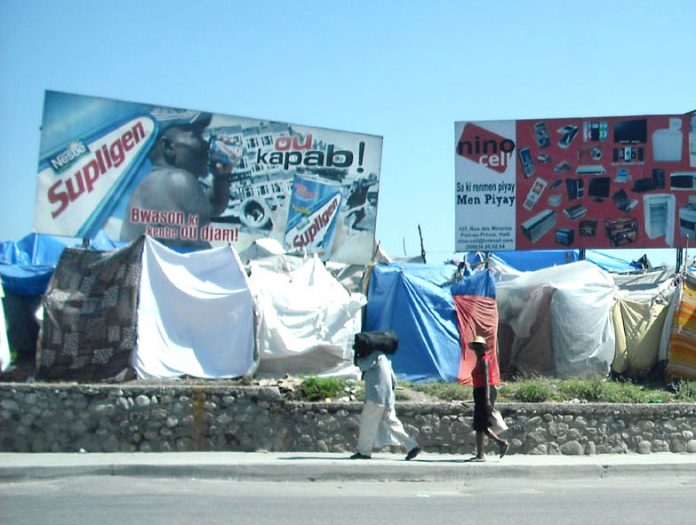The United Nations and its partners have finalised the Cholera Inter-Sector Response Strategy for Haiti, a plan to support the Government of Haiti’s response to the current cholera epidemic, the UN Organisation for the Coordination of Humanitarian Affairs (OCHA) reported last Friday.
An OCHA statement said: ‘The Strategy includes projects from 42 nongovernmental organisations, five United Nations agencies, and the International Organisation for Migration, in support of the Ministry of Public Health and Population (MSPP) and other entities, which is leading the response.
‘The total amount requested is $163,894,856.
‘The epidemic has spread rapidly since it was first confirmed on 22 October.
‘Well over 12,000 Haitians have been hospitalised so far, and over 800 people have died.
‘The Strategy anticipates a total of up to 200,000 people expected to show symptoms of cholera ranging from cases of mild diarrhoea to the most severe dehydration.
‘This number was calculated based on other countries’ experiences, and calculations by the Pan-American Health Organisation/World Health Organisation and the United States Centres for Disease Control.
‘Cases are expected to appear in a burst of outbreaks that will happen suddenly in different parts of the country.
‘Epidemiologists anticipate that the epidemic will continue to spread throughout the country and resources will need to be mobilised for at least six months.
‘The Strategy has several elements, including public communications outreach, rapid operational response, access to health services for those affected, disease surveillance, supporting and strengthening the national response, ensuring clean water, and providing safe sanitation and waste management for high risk areas.
‘The largest financial component of the Strategy is for water, sanitation and hygiene ($89 million), followed by health ($43 million) and camp coordination and camp management ($19 million).’
‘A major effort has already been made, but the sheer quantity of relief items that need to be delivered in the days and weeks ahead is going to require more logistical and financial support for the Government by all humanitarian agencies and donors and very close coordination,’ said Nigel Fisher, Humanitarian Coordinator in Haiti.
‘Without this the epidemic could well outrun our efforts,’ he said.
In a separate statement issued last Friday, charity Save the Children said: ‘With more than 700 people dead and 11,000 now sick from cholera in Haiti, Save the Children warns that educating people about how the disease is caught and spread will be crucial to stemming a nationwide epidemic that could threaten the lives of thousands.
‘As part of a massive health education campaign, Save the Children is going into communities to advise families on how to recognise the killer disease, the importance of taking preventive measures and seeking medical help as soon as symptoms emerge.
‘Around 40 per cent of the cholera victims in Haiti so far have not died in a hospital or a clinic, which implies they have not had access to treatment or may not have recognised the tell-tale symptoms, primarily acute watery diarrhoea, of cholera – a waterborne disease that can kill within hours of symptoms emerging.
‘Cholera has now been confirmed in the capital Port-au-Prince where more than a million people have been living in crowded temporary camps since the earthquake in January and millions more live in the city’s squalid slums with next to no access to clean water or proper latrines.
‘In these areas, where people have very limited access to health care and live in unsanitary conditions, the waterborne disease could spread with terrifying speed.’
Nick Ireland, leading Save the Children’s cholera response in Haiti says, ‘A huge number of people are already affected by this outbreak.
‘At this point, our best hope is to reduce the rate at which cholera spreads and the best way to do this is to arm people with health information, clean water and soap.
‘Health workers are going into Haiti’s slums and camps and blocking the charge of cholera through the most vulnerable communities by giving simple steps to save them and their children from the disease: use clean water and soap to wash your hands, only drink boiled or treated water, spread prevention messages and seek treatment at the very first signs of the disease.
‘People are not just victims of this cholera outbreak, they are the key to quashing it.’
Save the Children added: ‘Despite the best efforts of the Haitian authorities and aid workers, the number of deaths from the disease has doubled in the past week.
‘There hasn’t been cholera in Haiti since the 1960s – people need to know what cholera is, where it comes from, the huge risk it poses and, crucially, how they can protect themselves and their families from it.
‘Save the Children’s immediate concern is to reach the poorest neighbourhoods that currently have limited access to health services, clean water and sanitation in densely populated areas like Port-au-Prince, as well as Jacmel, Dessalines, Maissade, and Leogane.
‘The children’s charity has been working with the Haitian authorities and other humanitarian organisations since the beginning of the outbreak to prepare for the worst case scenario of a nationwide epidemic.
‘It has focused on reaching into communities with information on how to prevent the spread of the disease, the importance of hand washing, treating water and seeking medical support at first signs of the disease.
‘It has also been distributing clean water and building sanitation facilities in camps and slums.
Nick Ireland says: ‘Epidemics are like organisms, they have lives of their own.
‘It’s unclear how this outbreak will play itself out but we are all planning for a worst case scenario.
‘The humanitarian community has ramped up its efforts to get lifesaving messages out. It is crucial that we help communities to stamp out this killer disease.’
